Abstract
BEFORE intercalation of other molecules between the carbon hexagon networks in graphite can be started, they must first be given a sufficient chemical or electrical overpotential. The excess potential needed depends in a sensitive way on the textural perfection of the graphite used, which makes measurements of overpotential a valuable diagnostic test with near ideal graphites1.
This is a preview of subscription content, access via your institution
Access options
Subscribe to this journal
Receive 51 print issues and online access
$199.00 per year
only $3.90 per issue
Buy this article
- Purchase on Springer Link
- Instant access to full article PDF
Prices may be subject to local taxes which are calculated during checkout
Similar content being viewed by others
References
Ubbelohde, A. R., J. de Chimie Physique (in the press, 1969).
Heerschap, H., Delavignette, P., and Amelinkx, S., Carbon, 1, 235 (1964).
Author information
Authors and Affiliations
Rights and permissions
About this article
Cite this article
UBBELOHDE, A. Overpotentials for Intercalation into Graphite. Nature 223, 495–496 (1969). https://doi.org/10.1038/223495a0
Received:
Revised:
Issue Date:
DOI: https://doi.org/10.1038/223495a0
Comments
By submitting a comment you agree to abide by our Terms and Community Guidelines. If you find something abusive or that does not comply with our terms or guidelines please flag it as inappropriate.



